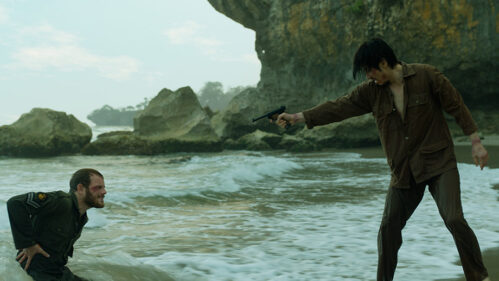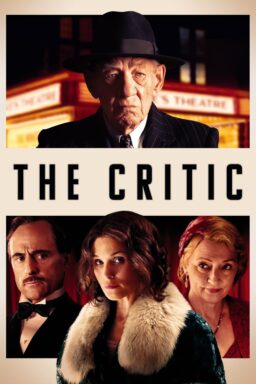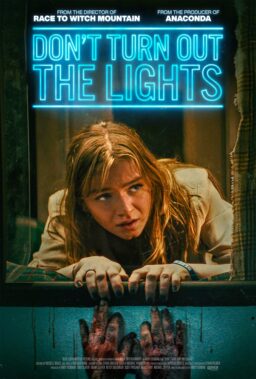Two of the three films in this dispatch were inspired by true events, while the third reflects the dire situation many women face regarding their bodily autonomy across the globe. Director William Goldenberg's "Unstoppable" tells the remarkable story of NCAA champion wrestler Anthony Robles. Kristina Grozeva and Petar Valchanov's "Triumph" skewers Bulgarian politics through a sensational real life headline from the 1990s involving a secret army mission and alien artifact. Georgian writer-director Dea Kulumbegashvili's harrowing drama "April" examines the heavy price women pay when they do not have full autonomy of their own bodies and reproduction rights.
Inspired by the true story of Anthony Robles, who became an NCAA champion wrestler despite being born without a right leg, "Unstoppable" is a crowd-pleasing drama anchored by a strong performance from Jharrel Jerome. From his breakout in "Moonlight" to his Emmy-winning performance in "When They See Us," Jerome has proven himself one of the finest actors of his generation. He is a master of conveying depth of emotion and nuanced internal conflicts solely through his eyes and body language. While the role of Robles offers him the perfect vehicle for his immense talent, the film around him struggles to reach his same heights.
As we follow Robles' journey from winning the national high school championships through the ups and downs of his college years that culminated in his crowning NCAA achievement, Jerome is supported by a bevy of stellar actors. This includes Jennifer Lopez, who is always underrated for her dramatic work, as Robles' mother Judy. Unfortunately, the script, credited to three writers—Eric Champnella, Alex Harris, and John Hindman—mostly reduces her to a series of trite clichés. Judy, we are told in a postscript, eventually earned her doctorate in education, yet the only depth of character before that comes from what Lopez brings to the role. The same goes with Michael Peña and Don Cheadle, who are both solid as his high school and college coaches but exist solely to impart just the right amount of wisdom when he needs it. Although Bobby Cannavale's abusive stepfather is also one note, it actually works to contrast his outdated brand of toxic masculinity with Robles' strong sense of moral strength.
Worst yet, first-time director William Goldenberg (who won an Oscar for editing "Argo") doesn't seem to trust his actors, often undercutting their strong performances by cutting away from them during their monologues. In one scene, he bizarrely holds on the back of Peña's head as Robles bares his soul. Somewhere on the cutting room floor, I know Jerome was giving him gold. If only Goldenberg had just kept the camera focused on his face and let his eyes do the heavy lifting.
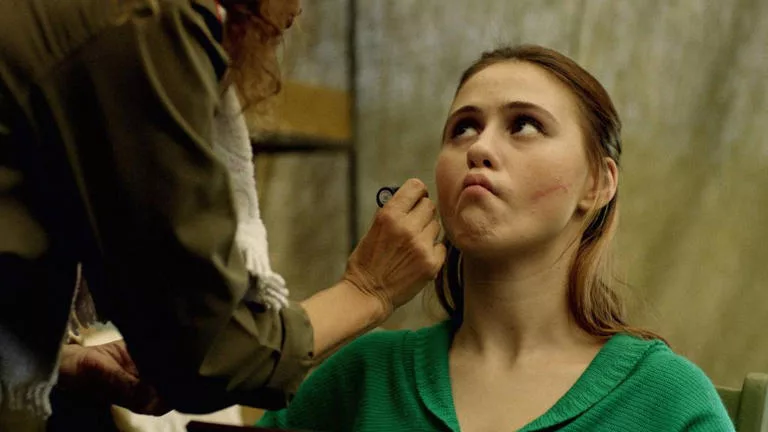
Developed by Oscar-nominee Maria Bakalova's production company, whose aim is to bring more Bulgarian and Balkan cinema to mainstream audiences, "Triumph" is a dry-as-toast satire set in Bulgaria during the post-Soviet 1990s. It is the third film in co-directors (and Bakalova's one-time professors) Kristina Grozeva and Petar Valchanov's trilogy of films inspired by sensationalist headlines. Bakalova stars as Slava, the daughter of Colonel Platnikov (Julian Vergov), a science officer for the Army, who is leading a mission to find an alien artifact supposedly buried near the small village of Tsarichina. The dig is ordered by General Zlatev (Ivan Savov), on the insistence of her personal psychic Pirina (Margita Gosheva), who believes the object will help make Bulgaria great again. Slava, still traumatized from her mother's death, slowly begins to believe she, too, is a conductor of psychic messages from the aliens, which eventually leads to a showdown between her and Pirinia, who may very well be a very good huckster.
Unlike Goldenberg, Grozeva and Valchanov know their biggest asset is Bakalova's soulful eyes, and the filmmakers often hold the camera on her silent reactions. Along with her expert comic timing, Bakalova can say paragraphs with just the slight tilt of her face or change in her smile. As Slava regains her long-lost confidence, her eyes begin to shine with secret ambitions and desires. Her Slava believes her own nonsense that the soldiers follow along as if everything she and Pirina are spewing isn't just so much baloney.
In the background, radio announcements can be heard, including a news report about how Bulgaria is the only Eastern European country where the former Communist leaders are being democratically re-elected to power. It's easy to see the parallels in the escalating ridiculousness of the dig with the country's struggles during this chaotic time in the country's history. Ultimately, the film excels as both a sharp political satire and a testament to Bakalova's multifaceted talent and potential.
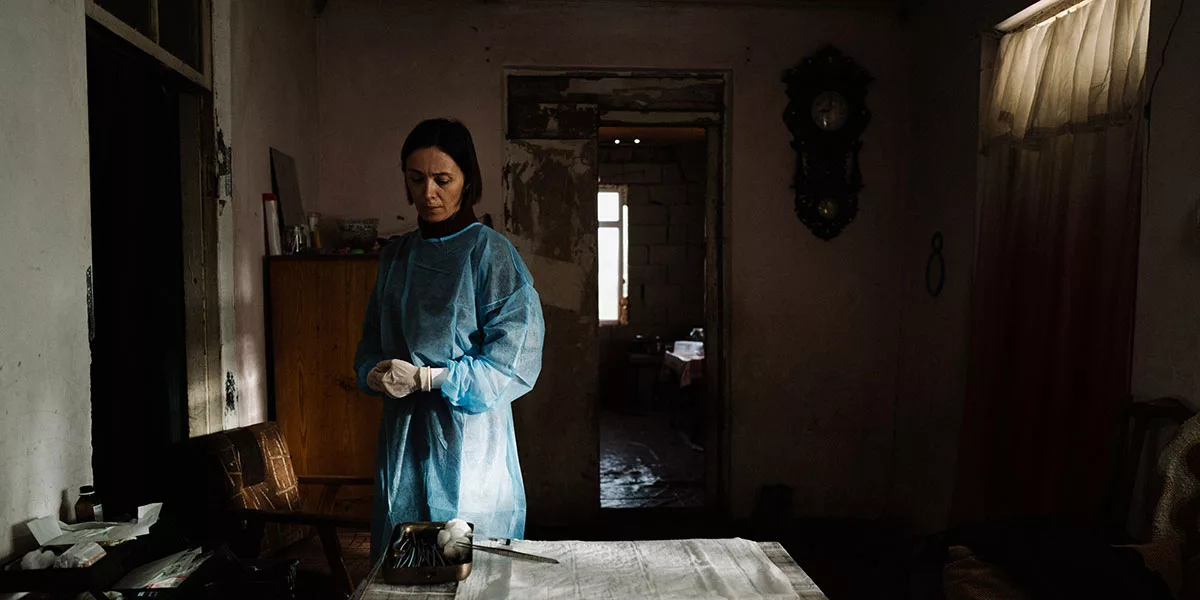
Georgian director Dea Kulumbegashvili's latest film, "April," continues her examination of female subjectivity in her home country. However, as she pointed out in her video intro at the film's North American premiere, the topic of female bodily autonomy and the fight for reproductive rights does not affect her small country; as I type this, many of my fellow Americans live in states that have stripped them of theirs.
The film begins with a bloody vaginal birth, shot from overhead in one continuous several-minute long shot, that ends in a tragedy. The attending ob-gyn Nina (Ia Sukhitashvili) is called to the office of her boss (Merab Ninidze) to face the father of the child who died. The incident is then investigated by her colleague and former lover, David (Kakha Kintsurashvili). Nina is a bit shaken by the incident but does not let it deter her from her work providing care to the women of this remote part of eastern Georgia. This includes performing abortions on villagers who cannot afford other means of obtaining the illegal procedures and helping married women—some of whom are still only teenagers—access contraceptive pills so that they have control over their reproductive health.
When she performs a clandestine abortion on a deaf-mute teenage girl whom a family member is sexually abusing, Kulumbegashvili places the camera in one static shot with the girl's pelvis centered on the frame. Her sister holds her hand slightly off-frame while Nina, also out of frame, performs the procedure. All we see is the girl's occasional twists of discomfort. The soundtrack comprises solely of her cries and whimpers. The film is largely composed of these kinds of long takes. At times, we experience the camera if we are in Nina's point of view, with characters looking directly into her eyes, which places the audience directly in Nina's head. The only sound heard on screen is often Nina's heavy breathing, which heightens these senses.
The film is bookended with surreal imagery of an old crone, her body wrinkled almost beyond recognition, eyes and mouth covered in skin. This is an extreme representation of the feelings of bondage that women in Georgia feel, and Kulumbegashvili evokes with her film. She contrasts this with a scene in which the hospital absolves itself of any wrongdoing in the child's death from the opening scene through a barrage of cold, clinical jargon, which renders the grieving parents just as voiceless as the many women we've met in Nina's office. "April" ends with the crone in a dark bog, walking towards the fall foliage. Kulumbegashvili leaves us wondering if the only solution for all of us is to completely return to nature.





